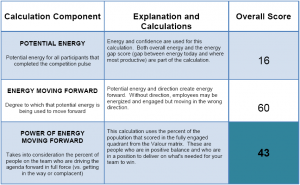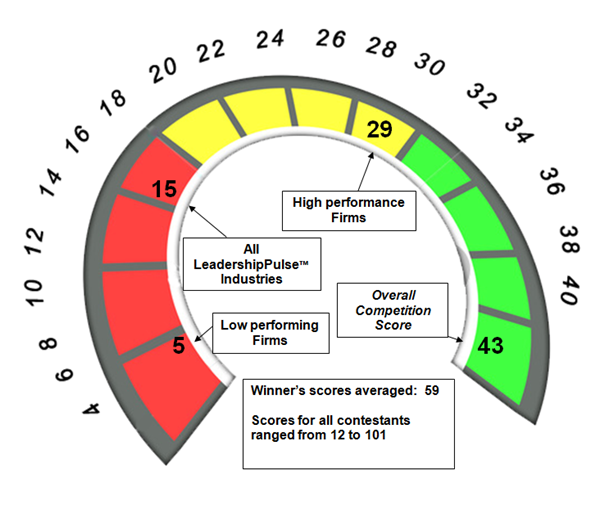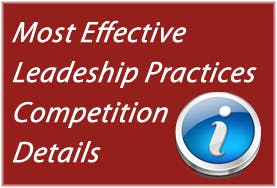The Most Effective Leadership Practices competition was a first in 2012. We started the work on the competition in 2011, and then the winners were announced at the 2012 TLNT Transform conference last February in Austin, Texas.
Now that all the work is done, we have time to go through the data and really dig into what these most effective leaders are doing. In this article I will briefly review the contest process and then summarize a few of the big learnings that are coming out of our research.
At this point, you may be wondering “why one more contest?” and thinking “don’t we have enough?” I too am tired of the “best” this and that competitions that are focused on public relations, so I am with you and understand this reaction.
The reason we ventured down this path with yet one more contest is that we were seeing a lot of managers motivating and energizing their teams, with no resources and getting no recognition. The recession has turned a lot of every day people into superstars, and the lessons learned from these every-day managers are important for the rest of us who need to learn.
Sure, you can read about Google, Southwest Airlines, GE and other large, successful organizations that are just so massively different from many of our organizations that the lessons just don’t apply. What many managers want is to learn from people like themselves. That’s why we started this new competition.
Contest process
Nominations were accepted via an on-line application form at www.leadershippulse.com. For those of you interested in getting involved next year, you can get more information there.
The project team went through the nominations and selected those who met a minimal set of criteria. The people who passed through this phase were called, and then the team at eePulse set up a data collection process with these individuals.
Employees affected by the leaders practices were sent a short survey. This survey used metrics that have been validated as predicting high performance in teams, thus, we did not ask about the manager per se (not a 360) but examined the effects of the practices. To understand what the practices were, open-ended comments were asked in the survey, and interviews were conducted.
Winners were determined by using an overall score and ranking the data from high to low. The qualitative data were then used to validate which people should be winners.
2012 Leadership Competition winners
Here is a list of the 2012 winners:
- Robert J. Remenar (CEO/President), President and CEO, Nexteer Automotive;
- Philip Potloff (C-level non CEO/President), Chief Information Officer, Edmunds.com;
- Patricia Hill (Senior HR Executive), Chief Learning Officer, NISC;
- James W. Miller (Director Level), Executive Director of Production Control and Logistics, Nexteer Automotive;
- Steve Spicer (Leader in a Non-Management Role), Global Business Line Sales Manager, Electric Steering, Nexteer Automotive;
- Carol Walewski (First Line Manager), Engineering Supervisor, Yazaki North America;
- Melissa Van Dyke (Co-Winner Non-Profit), President, The Incentive Research Foundation;
- Hillary Simmet (Co-winner Non-Profit), Community Director, The March of Dimes.
Metrics
Craig Crossley, a senior executive at Schwan’s, relayed a story to me a few years ago that I have not forgotten. Craig and I were working on a project, and he said that what he wanted for his teams was an overall score of their health. He talked about taking his children in for their regular physical exams and how the doctor would talk about the percentile they were in on height and weight. What we did with the Most Effective Leadership Practices competition scorecard is an answer to Craig’s request (thanks Craig!).
Below you will see a graphic that shows the components that make up the overall score card. We used metrics that are validated, using longitudinal data and control variables, and that predict key business performance outcomes. They are not just correlated, they predict. We then took the validated metrics and pieced them together in a way that make up an overall score sheet for a team. That score was used in the contest.
Here is a sample (see left) chart. I don’t have space in this article to review all the details, but anyone who is interested can write me and ask for more information at info@eepulse.com.
Teams that participated could see how they scored against other teams’ data and against company level benchmarks. Below is a sample of the benchmarking scorecard.
High performing team scores, overall, are higher than the high performing companies. That should not be a surprise as the overall mean for any company is from a much larger and more diverse sample.
Learnings from the Most Effective Teams competition
Looking over all the data, qualitative and quantitative, we found that the most commonly mentioned practices were focused on communication. You are probably saying “not again.” Yes, we hear this in employee surveys, in focus groups and in almost any employee-centric mode of gathering data. Employees want communication.
What’s different about the most effective leaders is how they do the communications. They don’t just talk more; they don’t throw out more tops-down communications. Instead, they are more effective at two things: listening and doing.
They listen better, and then they are incredibly effective at pulling out the core nuggets of relevant information and doing something. They listen and take focused action, and then they continue to listen to what happened after they took action. They are adept at interactive dialogues with their employees, customers and other stakeholders.
The Nexteer Automotive story
They are willing to listen when times get tough. An excellent example of this behavior can be found in the story of Nexteer Automotive. Robert (Bob) J. Remenar not only won the CEO category, but his score was higher than that of any other participant. You will see that other Nexteer employees are on the winners list. That’s because, in true listening well fashion, they involved their employees in the nomination process.
The HR team at Nexteer asked employees to nominate teams or managers who they thought were most effective. They then used the results of that process to nominate people to the contest. In essence, then, the people nominated from Nexteer were the best of the best, meaning their scores and stories were fairly high.
Also, Bob Remenar, the CEO, was nominated by his employees. They told many tales of ways Bob listened and helped the company as it went through dramatic change. Nexteer Automotive had been Delphi Steering, and Delphi was for many years one of the largest bankruptcy stories. From bankruptcy to seeking an owner, the level of change was extraordinary.
Then Delphi Steering moved from financial trouble to finally being purchased by a Chinese company. This was yet again a dramatic change for the Nexteer employees, and every inch of the way, the Nexteer team took steps to listen and do — to do whatever they could under extremely high change conditions.
Listening: an undeveloped art form
What we learned from the Leadership Pulse overall and from the competition is that most leaders don’t know how to communicate. They answer the need for communication by doing more newsletters, holding more meetings and talking at people. They then create a bigger communication problem.
Effective leaders listen, and they engage in ongoing, interactive dialogues. We find that this skill, when taught, leads to higher energy, confidence, ongoing alignment, accountability and high performance.
We have examples of teams around the world who have changed their performance by learning to engage in interactive, focused dialogues. This is what we found the most effective leaders do, whether the team is 5 employees or 50,000 employees — and whether the team is virtual or in the same room.
For more information on the interventions used and additional lessons learned, contact our team at info@eepulse.com. We would very much like to listen to your stories.
